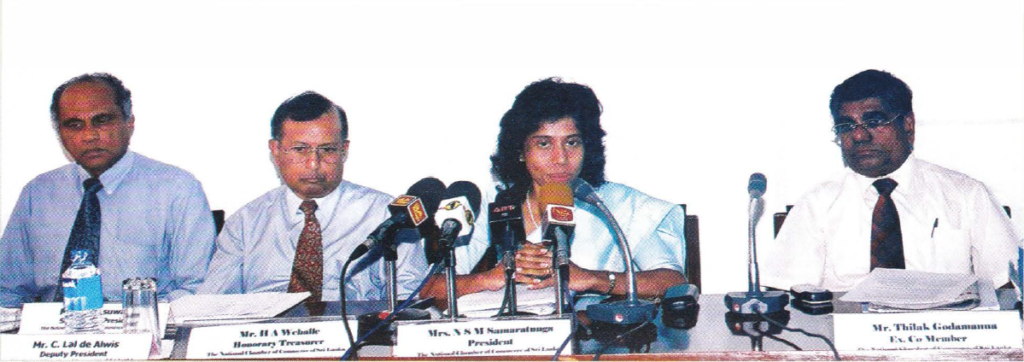By Anisha Niyas

The National Chamber of Commerce of Sri Lanka (NCCSL) released its analysis on President Mahinda Rajapaksha’s maiden budget recently. “The 2006 budget speech has been presented on a platform of continuing peace, since the projections are based on achieving strong economic growth,” stated Nirmali Samaratunga, President of NCCSL, at the press conference. Previous proposals that were in the November budget have been retained, with a greater emphasis on reducing regional growth disparities and providing support to the marginalizing sectors of the population. The budget also incorporates the ‘Mahinda Chinthana’ policies, which is the framework for the six-year development plan for the country. “Since this is a developmentoriented budget with concessionary agreements, the government will need to find money from aid or grants.
There will also be the question of reaching targets, the proper utilization of money and the need to monitor foreign aid,” said Ananda Wehalle, Honorary Treasurer of the NCCSL Budget Committee. The budget proposals will necessarily increase the government’s recurrent expenditure and reduce the fiscal space within which the government will have to operate. This will impose a key challenge to ensure the revenue growth targeted mainly through the proposed fiscal measures are achieved, in order to maintain the budget deficit at the targeted 7.3% of GDP.
“The whole budget depends on whether fixed targets are reached. If there is a shortfall, there will be a direct impact on economic investment and growth,” stated Samaratunga. The specific incentives provided for investments in less developed provinces are seen as a step in the right direction. The practicality of implementation, however, will need to be demonstrated. The proposal to give tax exemptions to financial institutions that provide loans to set up regional businesses is a positive move. However, the NCCSL recommended that there be mechanisms to ensure that this benefit will be passed on to borrowers who invest in those areas as opposed to the large and prime borrowers of financial institutions. Also recognized in the budget is the reduction of taxation on Small and Medium Enterprises (SMEs), along with the importance, which the agricultural sector plays in the economy of Sri Lanka. The proposals to streamline the tax administration, as it will broad base the tax net and reduce the inconvenience to genuine taxpayers, were welcomed by the NCCSL. It emphasized the importance of those liable to pay tax to do so, in order for tax revenues to be increased in a sustainable manner. However, the budget continued to be silent on many key liberalization issues that are essential for private sector development. “The budget proposals are commendable and noteworthy in terms of its focus; the efficient implementation within a sound macro economic framework will be the key challenge,” noted Samaratunga. Several proposals made by the NCCSL were included in the national budget following representations they made. In addition, the Chamber was active in several National Council for Economic Development ( ‘CED) clusters e.g., trade, tariff, export, SME, and the capital market. NCCSL proposals incorporated in the national budget proposals include those for infrastructure development, transport and shipping sectors, measures to maintain law and order, incentives for local industry and SMEs, regional development, support to the agricultural sector with particular interest in the organic product sector, assisting the export sector by refunding VAT within 15 days, and promoting technology. ®




